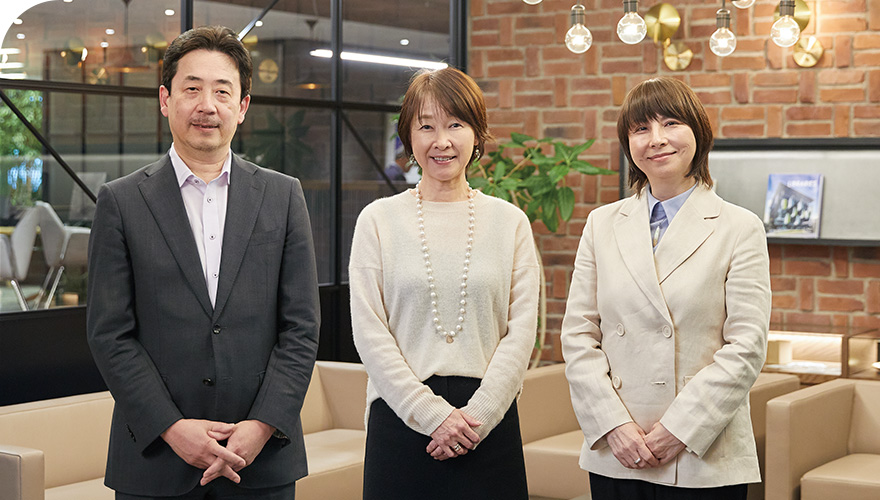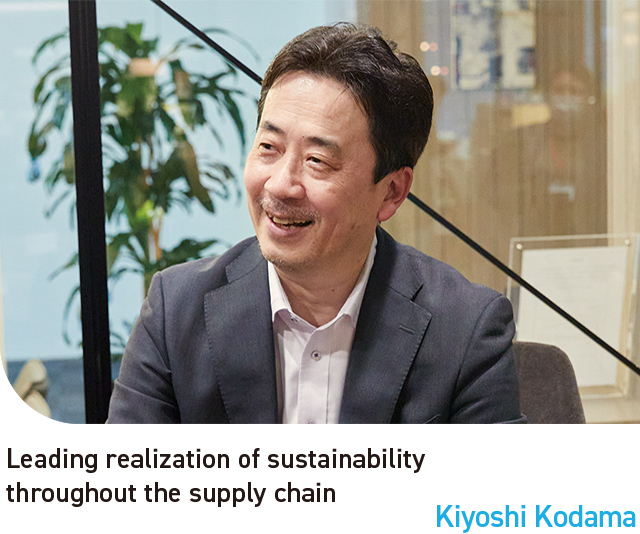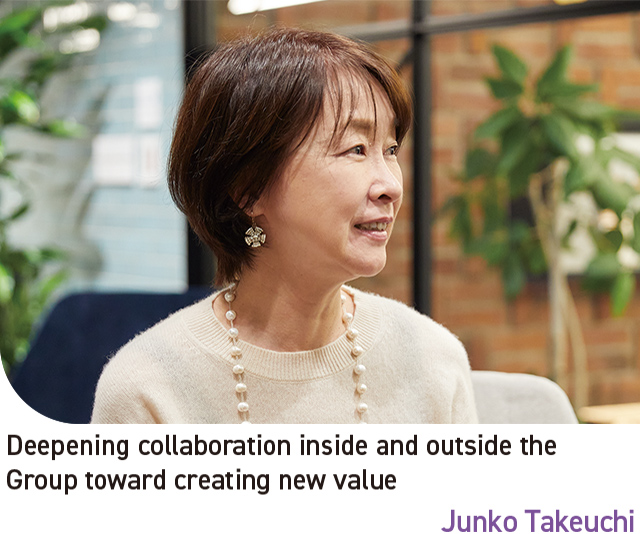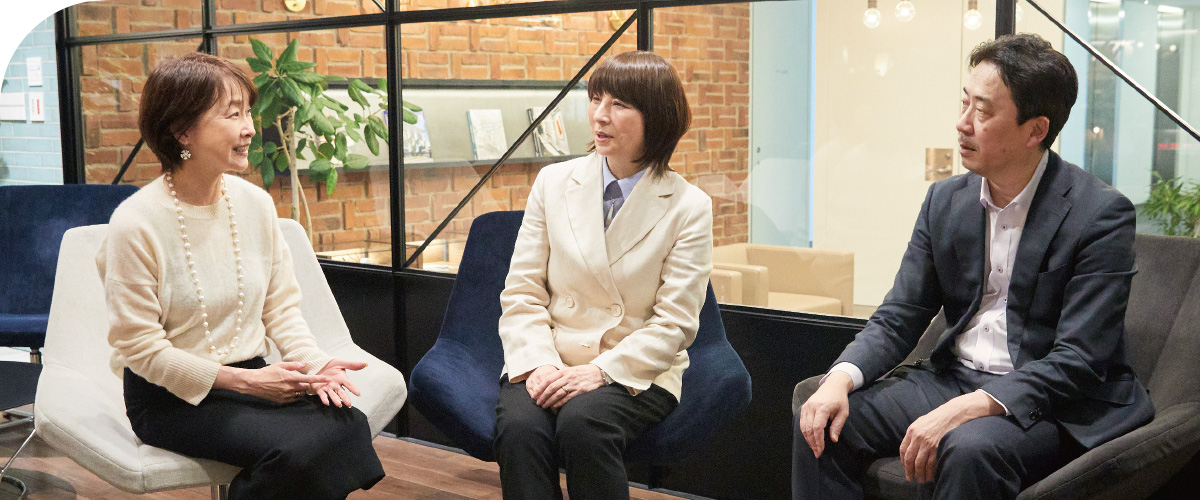Feature Sustainability Discussion

The PLUS Group, which continues pursuing sustainability while sticking to our unique values, takes various initiatives according to social trends and changes in the times. Responsible persons from three companies spoke with each other about how the corporate culture, strengths, and resources of The PLUS Group should be utilized to provide new value to society going forward. (Facilitator: Toppan Holdings Inc.)
From left to right
- Kiyoshi Kodama
Executive Officer, Division Manager, Merchandising & Purchasing Division, JOINTEX Company - Junko Takeuchi
Executive Officer, PLUS Brand Manager and Divisional Director, Marketing Division, Stationery Company - Yumiko Nonaka
Executive Officer, General Manager of Creative Business Division and Deputy Chief of Sales Headquarters, Furniture Company
Mission of three companies
Stationery Company (hereinafter, “PSC”), which deals in stationery, the original business of PLUS, values the successive creation of products with new concepts as “value creation”. Our brand awareness surveys have shown that the strength of PLUS stationery is its superior design. The pursuit of uniqueness touted in our philosophy is the lifeline of the company.
PLUS, which was originally engaged in the stationery business, established the Maebashi Plant in 1991 and transformed into a fully-fledged manufacturer. Furniture Company (hereinafter, “PFC”) continues sharing information and making proposals centered around working people, as to the ideal state of offices in an era in which our workstyles are becoming diversified. Based on the concept of “offices are media,” PFC assists in the shaping of the corporate culture of our customers by providing furniture and designs for work environments. Moreover, as hybrid work is becoming more commonplace, we are touting the phrase “attraction to offices” as a keyword to symbolize the needs of offices. Our mission is to provide platforms that allow anyone to work in an exciting and active manner regardless of their gender, age, or position.
JOINTEX Company (hereinafter, “JTX”), which started operating in 2001, is responsible for the logistics processes following manufacturing. In business-to-business markets, we deliver the products and creative work needed in the workplaces of our customers at an appropriate price and in an extremely convenient manner. JTX is not involved in manufacturing, but its pursuit of uniqueness is the same as the other companies. Another one of our missions is to provide products with unique values that cannot be found from our competitors. In particular, because we handle a wide range of products from manufacturers aside from PLUS, we also bear the responsibility of supporting the development of better products by providing feedback on market trends to the Group. We also recommend non-PLUS products so that we can deliver the best items to our customers.

How do you interpret the meaning of “PLUS-like”?
The major characteristic of PSC is that a single department is in charge of a broad value chain in the area of stationery, from ascertaining needs, product planning, marketing such as sales promotion planning and social media, to planning for mass production. We are also deeply involved in engineering and communication with plants. This is not something you would see many of our competitors doing. In the stationery industry, the market scale of each category is smaller than that of other consumer goods, and our main area of office supplies is already a mature market, so it is difficult to differentiate ourselves from the competition. Therefore, we deem it important to gain an accurate understanding of the needs of consumers and create new value. To that end, we believe that it is important that we reflect our insight into all processes, from upstream processes to downstream processes, and that is the foundation of being “PLUS-like”. Naturally, another point that we must always focus on is achieving both unique designs and ideas, and plant operation efficiency and our sales volume.
At PFC, we are also closely involved with the value chain. We propose and provide products and planning with a deep understanding of changes in the times and the needs of customers, and we always take an approach that is focused on working people. There are cases where partners selected us because they wanted to work together with PLUS to proceed in their projects. We believe that we have an outstanding approach to creating new value while taking on new challenges and sincerely communicating with various people from the management of our customers, project members, to their employees. Additionally, another focus of PFC is how to solve the management problems in customer workplaces. Our solutions change according to changes in the times as well as the business scales of our customers. One example of such a change is the change of the approach to open-planning offices from the “effective utilization of space” to the “revitalization of communication.” I feel that this ability to provide comprehensive response based on the synergy of The PLUS Group, from products to creative work, is what it means to be “PLUS-like”.
At JTX, we also carefully respond according to the needs of the times and the business scales of our customers. The trend that we are focused on is the yearly increase in the need for environmental considerations in business purchasing. On one hand, we have many customers who are small and mediumsized businesses, and there are many cases where they do not apply sufficient resources to achieve sustainability. Therefore, JTX is concentrating efforts to be able to contribute to promotion of sustainability, with the top priority being solving customer issues in cooperation with sales partners throughout Japan. As a company in charge of sales and logistics, we would like to become more sensitive to information to exert our presence.
Achieving our mission
Please tell us about your current issues and your initiatives for overcoming them.
We believe that the most important thing is to increase frameworks and services that realize environmental considerations and achieve user convenience. In the smart business sector, we started a service in which users can specify days of week for delivery. This service reduces the workload for receiving deliveries at busy sites, such as schools, child-rearing facilities, and nursing and welfare facilities, while simultaneously reducing the load on logistics and the burden on the environment. The number of users who agree to this system is gradually increasing, and we feel that it is crucial to have frameworks that gain the consent and cooperation of users. Naturally, we have added more environmentally-friendly products to our product lineup, and we have a strong awareness of creating a mood for sustainability.
At PSC as well, we are also focused on developing environmentally-friendly products with reduced use of plastics and increased use of recycled materials. Stationery products are sold in regions throughout the world, and the Group has increased the ratio of products sold outside Japan. In particular, Europe has strict restrictions on the use of plastics and chemical components in packages, so globally expanding the sales requires environmental considerations. At PSC, we have advanced cuttingedge environmental considerations in manufacturing processes at our plants and we have developed various environmentallyfriendly products based on feedback from our customers. Our new series, the “COE365,” which we released in February of 2024, has a package-free design with recycled resin used in the main part of the product, and it has gained attention from generation Z thanks to its stylish design. Our Sustainability Development Policies that we formulated together with PFC are also symbolic measures. These policies contain items such as “Are resources used only in required amount? Do they have a long life? Do the resources have a small burden on human health? Can the resources be used by anyone?” They also function as a checklist for environmental perspectives as well as those concerning universal design and social contribution.

PFC also started using the Sustainability Development Policies from last year. With regards to a materiality of the critical initiative theme of “Satisfaction for the Global Environment,” we have advanced sustainability activities such as solar power, initiatives concerning waste and quality, and regional contribution activities. With regards to product development as well, in order to meet the needs of measuring C02 emissions, we are making progress while reassessing perspectives on manufacturing while also keeping in mind sustainable product development that enables visualization of the emission amounts for each process. Moreover, we think that permeation of manufacturing having an awareness of sustainability is accelerating. For example, there is emphasis on collaborative initiatives between industry and academia based on sustainable thinking.
JTX is in the position of undertaking the procurement management of customers and asking our suppliers to conduct their activities in line with Green Procurement Guidelines. However, we believe that we should declare our commitment to following the guidelines before asking our partners to do so. In that sense, it is extremely significant that The PLUS Group established the Sustainability Policies in 2022, and furthermore, PSC and PFC have started using Sustainability Development Policies, and I am personally very satisfied.
At PFC, we are aware of the issue that we must always continue moving forward so that customers can resonate with our offices and working environments. The PFC office has obtained the highest rank of S Rank in the CASBEE Wellness Office Evaluation System, and PLUS CORPORATION has received KENKO Investment for Health 2024 accreditation. Through these certifications, we are asking everyone at our companies to have a strong awareness of what they need in order to improve their competitive potential in their business.
The issue of promoting sustainability in logistics is how we can accelerate the creation of frameworks throughout the society as a whole. Naturally, environmentally-friendly products have a high unit cost. We believe that we need to work with governments entities and the like to construct frameworks to convince customers to purchase these products, despite their high cost or to distribute them at a low cost.
We have placed major importance on the strengthening of partnerships at manufacturing sites as well. With regards to the procurement of recycled materials in particular, we are currently scrambling over information. At PSC, we have a policy of strengthening cooperation with other companies through participation in industry groups and the like while conducting study seminars where participants can acquire specialist knowledge about biomass and biodegradation.
At PFC, we consider it important to have an approach for utilizing and visualizing data of the effects of the promotion of sustainability, such as environmental response. By measuring the illuminance, ventilation, temperature, and humidity in office environments, numerically measuring the operating status of seats, and visualizing the working environment and comfortability, there is a growing business need for managing such data, as an actual KPI of, for example, realization of “productivity improvements” in their management indicators. In response to such a need, PFC provides solutions by utilizing data. For example, for our Suwary simple seat reservation app, we are visualizing office data while adding new functions that were not installed at the initial stage of development.
JTX operates a catalog mail order business, so we naturally maintain a high degree of sensitivity with regards to IT. In addition, in our smart business for delivering the necessary items to educational and nursing sites, we prioritize how to reduce areas that rely on human labor in order to respond to the concerns of our customers. For example, we devise services for supporting teachers who lack experience in the latest ICT education tools and devise frameworks that make it possible to consolidate orders and payments of occupants of nursing facilities. In the education and nursing industries, which are constantly busy due to lack of personnel, which work will be handled by IT in order to increase convenience and contribute to reducing the stress on working people? We think that, in addition to simply selling items, providing support to increase the capabilities of solutions while sharing knowledge with vendors, who are our partners, helps us manifest PLUS-like uniqueness.
Acceleration of in-house cooperation
What types of in-house cooperation are you taking in order to realize PLUS-like sustainability?
We think that the PFC base “PLUS DESIGN CROSS,” established in Ebisu, is truly the embodiment of the sustainability policies. It functions as a live showroom, and the over 10,000 visitors who have been there were amazed by the office design as well as the office structure based on the concept of co-creation in order to create new value. Visitors have said that this is the kind of office that they would like to create. An issue common to our customers, with the increase in remote work, is how to stimulate employee communication to yield creativity. In order to present solutions as PLUS, we are also creating frameworks that allow us to carefully tackle daily improvements and to make it possible to properly explain the practice of social optimality of PFC to our customers.

At JTX, in order to realize materialities connected to “Satisfaction for Society” at a high dimension, we have been hosting, for about 20 years, the “JOINTEX Award”, to employees who have produced new value from the perspectives of social optimality and customer satisfaction. One particular example of an outstanding case is named the “New Middleman※ Grand Prize”. In order to provide better services and expand our product lineup with importance on “habitant perspectives” that aim for better living, departments such as Sales & Marketing, Merchandise Headquarters, Logistics Planning, and Quality Control continuously hold discussions in an inter-disciplinary matter. Junior colleagues also have a profound understanding of issues, and they reliably help others address the issues.
- New intermediary distribution business that JOINTEX Company aims at, and that continuously provides new functions and values
“Habitant perspectives” have also been reevaluated by PSC. We made efforts to define “PLUS stationery” as a prerequisite for creating new value. This involves formulating guidelines of “bringing a plus to the world by improving the moods of people through the tools that they use for work, learning, and in their everyday lives”, and further pursue PLUS-like emotional value of surprises and enjoyment by reexamining the knowledge and business results that we have fostered to date and gaining new understanding from new axes. Also, in 2023, we touted our new brand statement of “Stationery, and beyond”. This statement incorporates the idea of creating value in new areas, beyond the scope of stationery, amid rapid changes in the stationery markets, such as going paperless, a declining birthrate, and the spread of AI. Our policy is to concentrate on our pursuit of an even higher degree of uniqueness. We will do this by further deepening cooperation throughout the Group, which includes Pentel Co., Ltd., THE SAILOR PEN CO., LTD., and Nippon Notebook Corporation, and establishing the number of reports made at planning meetings as a KPI and monitoring it on a monthly basis.
I feel that PLUS has developed a corporate culture where, as all members involved in the missions of the concept of social optimality engage in thorough communication with each other, we are attentive to the behaviors of and respect each other, and value our customers and partners. We would like to propose new value with everyone at PLUS working together, while communicating closely within our own departments and with people at other companies.
Towards the future
How will you utilize the Sustainability Policies and materialities?
While pushing forward in our business, stakeholders, such as customers, have asked us to stipulate in a written form the approach to sustainability at The PLUS Group. We feel that the formulation of PLUS-like Sustainability Policies and materialities has created a clear outline of the value perspectives that everyone has had. Approximately two years have passed since we formulated these, and we feel that there has been major progress in sharing both inside and outside companies and in activities related to materialities. We believe that we have shifted toward steadfast changes towards the realization of PLUS-like sustainability.
Indeed, the Sustainability Policies and materialities are approaches that had permeated the work styles of employees even before they were formulated. In order to accelerate the loops of solving business and social issues going forward, we believe it is important to make efforts to properly reassess these as a language instead of senses and further improve our awareness.
It goes without saying that we at PLUS have been tackling sustainability for a long time. In recent years, we feel that the social value of such initiatives has increased. Changes in how we think about social problems such as environmental issues, and in how we work and learn brings about changes in manufacturing as well. I would like us to continue creating products that put smiles on the faces of our customers while maintaining a timely understanding of changes in the times.
I agree whole heartedly. I think the most important thing is for us to continue creating ideas that people resonate with. Failure to create products that customers can resonate with will have a negative impact on our relevance. We will create new value and change our own behavior with our individual understandings of the issues of our customers. I believe that is PLUS-like creativity.

Please tell us about the strengths and missions of your company?